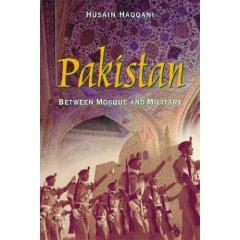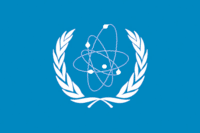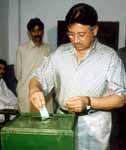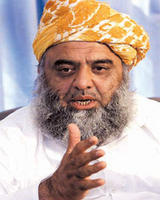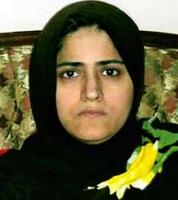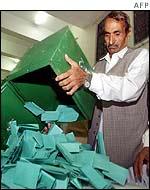 We thought we had seen and heard it all, but this takes the cake.
We thought we had seen and heard it all, but this takes the cake.Don't worry soon it will all be brushed under the carpet so that we can 'officially' pretend as per Musharraf and Shaukat Aziz's words that the local government elections were 'free, fair and transparent'.
___________________________
Daily Times reports that in the National Assembly yesterday:
- The prime minister expressed his satisfaction on the 'free, fair and transparent' local government elections. As he concluded his speech, several members stood up and rejected his claims.
- Prime Minister Shaukat Aziz was cornered into an embarrassing situation on Monday after several treasury members of the National Assembly accused their own government of rigging the local council elections.
- We are the victims of massive rigging. The entire nation is united against this rigging,” shouted treasury parliamentarian Riaz Hussain Pirzada on the floor of the National Assembly (NA).
- Sources said Pirzada accused that the government machinery was used to ensure the victory of selected candidates. He said the party central and provincial leadership had given a cold response to his complaints. Chaudhry Shujaat Hussain, the PML president, tried to hush up the matter, but the annoyed MNAs said they would not stay quiet. They said that the PML's top leadership had its own interests in the matter.
- Sher Akbar Khan, another treasury member, said he was the victim of pre-poll rigging by a minister of state. He did not name the minister, but sources said he was referring to Amir Muqam, the Minister of State for Water and Power.
- Several treasury MNAs vented their feelings during the parliamentary party meeting of the ruling coalition before the NA session. They criticised the top PML leadership of protecting its own interests.
- The MNAs demanded that the prime minister, who attended the meeting, explain his position and arrange their meeting with President General Pervez Musharraf to take up the issue of rigging.
- Farooq Leghari said his candidates were opposed by the PML's top leadership in his constituency. According to PML sources, the Chaudhrys of Gujrat had backed Hassnain Dareshak's candidates against Leghari's son, Jamal Leghari, in Rajanpur district.
- Khalid Lund, member of the Sherpao-led Pakistan People's Party (PPP), said his candidates lost the elections because Arbab Ghulam Rahim, the Sindh chief minister, rigged the elections.
- Daniyal Aziz, the National Reconstruction Bureau (NRB) chairman, and Maj (r) Tanvir Hussain also made similar complaints.
- Later, speaking on the NA floor Qazi Hussain Ahmed, the Muttahida Majlis-e-Amal (MMA) parliamentary leader, said the nation wanted the parliament to take action against the massive rigging.
- The entire opposition also grilled the government of manipulating the elections to change results in the favour of its candidates. The opposition members raised slogans and staged a token walkout from the proceedings.


